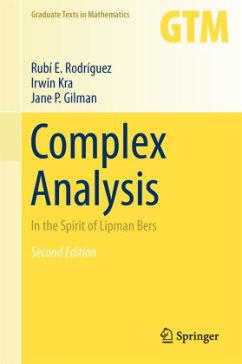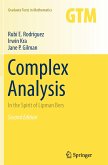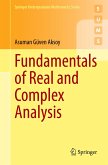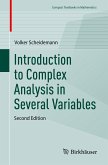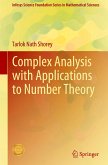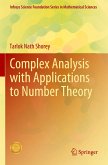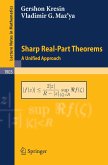This book is intended for a graduate course in complex analysis, where the main focus is the theory of complex-valued functions of a single complex variable. This theory is a prerequisite for the study of many areas of mathematics, including the theory of several finitely and infinitely many complex variables, hyperbolic geometry, two- and three-manifolds, and number theory. Complex analysis has connections and applications to many other subjects in mathematics and to other sciences. Thus this material will also be of interest to computer scientists, physicists, and engineers.
The book covers most, if not all, of the material contained in Lipman Bers's courses on first year complex analysis. In addition, topics of current interest, such as zeros of holomorphic functions and the connection between hyperbolic geometry and complex analysis, are explored.
In addition to many new exercises, this second edition introduces a variety of new and interesting topics. New features include a section on Bers's theorem on isomorphisms between rings of holomorphic functions on plane domains; necessary and sufficient conditions for the existence of a bounded analytic function on the disc with prescribed zeros; sections on subharmonic functions and Perron's principle; and a section on the ring of holomorphic functions on a plane domain. There are three new appendices: the first is a contribution by Ranjan Roy on the history of complex analysis, the second contains background material on exterior differential calculus, and the third appendix includes an alternate approach to the Cauchy theory.
The book covers most, if not all, of the material contained in Lipman Bers's courses on first year complex analysis. In addition, topics of current interest, such as zeros of holomorphic functions and the connection between hyperbolic geometry and complex analysis, are explored.
In addition to many new exercises, this second edition introduces a variety of new and interesting topics. New features include a section on Bers's theorem on isomorphisms between rings of holomorphic functions on plane domains; necessary and sufficient conditions for the existence of a bounded analytic function on the disc with prescribed zeros; sections on subharmonic functions and Perron's principle; and a section on the ring of holomorphic functions on a plane domain. There are three new appendices: the first is a contribution by Ranjan Roy on the history of complex analysis, the second contains background material on exterior differential calculus, and the third appendix includes an alternate approach to the Cauchy theory.
From the reviews of the second edition:
"The book under review is a second edition of a book by the same authors and with the same title, also published by Springer in 2007. It contains some amount of new information. ... The book is carefully written and each chapter has an interesting list of exercises. I found it very useful as am Undergraduate and Graduate Text in Mathematics." (José M. Ansemil, The European Mathematical Society, euro-math-soc.eu, January, 2014)
From the reviews:
"The book is written in a clear and easily readable manner, completed with a well cared selection of exercises. The book, which is certainly useful for all specialists and lecturers in complex analysis, I also recommend to beginners in this area." (Fernando Perez-Gonzalez, Zentralblatt MATH, Vol. 1262, 2013)
"This is a fairly conventional text for a first course in complex analysis. It is an interesting mix of the concrete and the abstract, and of the formulaic and the geometric. It has good exercises ... . It is nominally a graduate text (it is in Springer's series of Graduate Texts in Mathematics) ... . The book covers all the usual topics for a first course and includes a lot of advanced topics ... ." (Allen Stenger, MathDL, February, 2008)
"This book is based on the original courses of Complex Analysis that was delivered by the well-known American specialist and lecturer in Analysis, Professor Lipman Bers. ... the book is written in a clear and easily readable manner. ... this book is useful for all specialists and lecturers in Complex Analysis ... and also all specialists who deal with applications of Complex Analysis. I also recommend this book to beginners who want to study Complex Analysis ... ." (Peter Zabreiko, Zentralblatt MATH, Vol. 1139 (17), 2008)
"The book under review is a second edition of a book by the same authors and with the same title, also published by Springer in 2007. It contains some amount of new information. ... The book is carefully written and each chapter has an interesting list of exercises. I found it very useful as am Undergraduate and Graduate Text in Mathematics." (José M. Ansemil, The European Mathematical Society, euro-math-soc.eu, January, 2014)
From the reviews:
"The book is written in a clear and easily readable manner, completed with a well cared selection of exercises. The book, which is certainly useful for all specialists and lecturers in complex analysis, I also recommend to beginners in this area." (Fernando Perez-Gonzalez, Zentralblatt MATH, Vol. 1262, 2013)
"This is a fairly conventional text for a first course in complex analysis. It is an interesting mix of the concrete and the abstract, and of the formulaic and the geometric. It has good exercises ... . It is nominally a graduate text (it is in Springer's series of Graduate Texts in Mathematics) ... . The book covers all the usual topics for a first course and includes a lot of advanced topics ... ." (Allen Stenger, MathDL, February, 2008)
"This book is based on the original courses of Complex Analysis that was delivered by the well-known American specialist and lecturer in Analysis, Professor Lipman Bers. ... the book is written in a clear and easily readable manner. ... this book is useful for all specialists and lecturers in Complex Analysis ... and also all specialists who deal with applications of Complex Analysis. I also recommend this book to beginners who want to study Complex Analysis ... ." (Peter Zabreiko, Zentralblatt MATH, Vol. 1139 (17), 2008)

